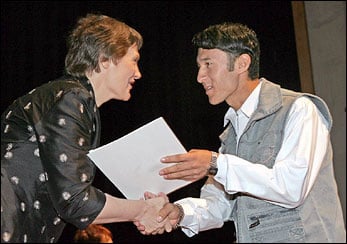Tampa Boys rescued by Norwegian freighter become New Zealand citizens
Tampa Boys rescued by Norwegian freighter become New Zealand citizens

MANUKAU CITY, New Zealand, April 8 (UNHCR) - Azizullah Mussa was just 14 years old when urged by his family, he left Afghanistan to escape the Taliban conflict, beginning a perilous journey to find a safer home. Today, aged 17, he is one of 76 former refugees rescued at sea by the Norwegian freighter MV Tampa off the Australian coast in 2001, who have been granted New Zealand citizenship.
Azizullah was the youngest of 37 unaccompanied teenagers - then aged between 14 and 18 - among 433 asylum seekers rescued from a sinking fishing boat in the Indian Ocean by the MV Tampa.
"When our boat from Indonesia was sinking we had a hopeless feeling. We thought we were going to die. Then we got on to the Tampa. It was like we got a new life. God has given me a new life and I have to start life in a different way than I had in Afghanistan.... I realise I have to be different from where I was in Afghanistan and to take opportunities and try to be a good person," Azizullah said.
The teenagers were affectionately dubbed 'The Tampa Boys' by officials who cared for them when they were subsequently accepted as refugees by New Zealand.
Excited and happy to receive his citizenship at a ceremony in Manukau City attended by New Zealand's prime minister Helen Clark, Azizullah in his second last year at high school, likens it to a graduation.
"I've been waiting three years for this day to come. I can call myself a Kiwi now," he said.
New Zealand's prime minister Helen Clark said the Tampa refugees had demonstrated their commitment to the country since their arrival.
"Today, they can proudly proclaim themselves citizens of New Zealand," she said, praising the way the Tampa teenagers had adjusted to life in their new land.
"I have followed the progress of the Tampa Boys over the past three and half years, and have seen and heard how they have embraced the New Zealand way of life, by settling into school, further study, and jobs and also by forming their own very successful soccer team, and even switching codes to support the All Blacks!" The All Blacks are New Zealand's famous rugby union team.
"Today's ceremony is a milestone in the lives of these new young New Zealanders. They are already making a positive contribution to New Zealand life, and our lives have been enriched by having them here," Clark added.
New Zealand Internal Affairs Minister George Hawkins said becoming a citizen is a privilege which applicants earn by demonstrating their commitment to New Zealand.
"The Tampa Boys have done that, and they have also brought a unique perspective to New Zealand through their own culture and traditions," Hawkins said.
That sentiment was echoed by Azizullah. "At school, I have to do hard work and be a good person and communicate with other people. I want to experience different cultures and the heritage of other people and keep my own culture alive as well," he said.
In February 2004, Azizullah was reunited with his parents and seven siblings under New Zealand's annual refugee annual quota of 750 people. Most Tampa Boys have been reunited with their families.
UNHCR Regional Representative Neill Wright congratulated the Tampa Boys and families on achieving citizenship.
"This occasion marks the start of their future lives as productive citizens of New Zealand. By all accounts, they have embraced their new home with enthusiasm, and are keen to make the most of opportunities," Wright said.
"I also thank the New Zealand Government for allowing the refugees to make New Zealand their new home, for reuniting them with their families and for the excellent services they provided to help them adjust into their new country," he added.
Settling into New Zealand, life for Azizullah is 'getting better and better' and he is learning new things every day. It's the freedom he values the most and being reunited with his family.
"Freedom means having education and opportunities, but also driving cars, being independent, and just being ourselves," he said.

In his second last year at high school, Azizullah would like to become a journalist or have a career in science. For the moment, however, he is keen to take every opportunity that comes his way. He is looking forward to getting a New Zealand passport, making it easier to travel around the world. In July, he will travel to the USA for a youth leadership conference with two other Afghan refugees from the Tampa.
Applicants for citizenship in New Zealand must be a permanent resident for at least three years and meet a good character and English-language requirement, amongst other things.
Overall, New Zealand has accepted 208 people from the Tampa as refugees, including 131 people straight from the Tampa and a further 77 who were resettled to New Zealand from Nauru after being found to be refugees. Today's group of 76 who received citizenship are the first of the former Tampa refugees to meet citizenship requirements.








